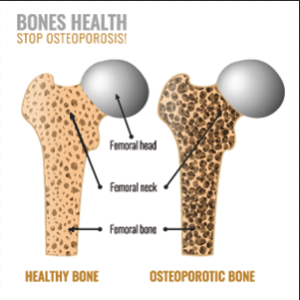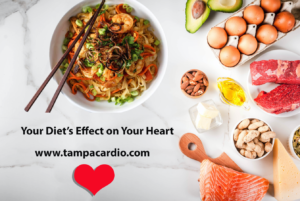Reviewed by health care specialists at UCSF Medical Center.
The original article appeared here.
The foods you eat directly impact your cardiovascular health. Improving your diet can help you manage current health conditions, such as high cholesterol, blood pressure and blood sugar, and can also help prevent future health problems.
What is a heart-healthy diet?
A heart-healthy diet is:
- High in omega-3 fats, found in many fishes, especially salmon
- High in fiber
- High in fruits and in green, red and orange vegetables
- Low in saturated fats and trans fats
- Low in sodium
- Low in sugar
- Low in cholesterol
- Low in alcohol or alcohol-free
- Calorie-balanced to support a healthy weight
What’s the difference between healthy fat and unhealthy fat?
Saturated and trans fats can be especially harmful to your heart and arteries. A heart-healthy diet is low in these harmful fats but includes moderate amounts of healthy fats. Mono- and polyunsaturated fats, especially omega-3 fats, are good for your heart.
When it comes to your weight, all fats are equally high in calories. When it comes to your heart, some fats are bad and some are good.
Why are saturated fats so bad for me?
Saturated fats are unhealthy primarily because they raise blood levels of low-density lipoprotein (LDL), the so-called “bad” cholesterol. No more than 7 percent of your calories each day should come from saturated fats. For a person eating 2,000 calories per day, that’s 16 grams of saturated fat, the equivalent of less than 3 ounces of cheese.
To decrease your saturated fat intake, cut down on meat, cheese, butter and cream. Switch to more plant-based fats instead. For example, add guacamole instead of cheese to your tacos. Spread peanut butter — especially natural peanut butter — instead of butter on your toast. Sauté vegetables in a teaspoon of oil instead of a pat of butter.
Why are trans fats so bad for me?
Trans fats, commonly found in deep fried foods or foods made with partially hydrogenated oils, are especially harmful because they raise LDL cholesterol and also decrease the “good cholesterol,” high-density lipoprotein (HDL). There is no recommended level of trans fat because any amount can be harmful.
Fortunately, nutrition facts labels on packaged foods are now required to list trans fat content. Read labels and avoid foods containing trans fats.
How much healthy fat should I have in my diet?
Research suggests that a heart-healthy diet can provide up to 35 percent of its calories from fat, as long as the fats are mostly mono- and polyunsaturated. For a diet of 2,000 calories, that’s a maximum of 78 grams of fat.
Unsaturated fats mostly come from plant sources, as indicated on the table above. One exception is the increasingly famous omega-3 fat, which is found in highest concentrations in oily fish, such as salmon.
Omega-3 fat, in the form of docosahexaenoic acid (DHA) and eicosapentaenoic acid (EPA), is being studied to find out exactly how it benefits health. So far, evidence is strongest for omega-3 fat’s ability to lower blood pressure and decrease blood levels of triglycerides. At the UCSF Cardiovascular Care and Prevention Center, we recommend eating fish frequently — at least two times per week.
For non-fish eaters, a fish oil supplement may be appropriate. Up to three grams per day of combined EPA and DHA is probably safe for most people, but, as with all supplements, be sure to check with your doctor before you start taking it. We also recommend visiting the Environmental Defense Fund website, which rates the safety of many fish oil supplement brands.
- Eat fatty fish at least twice a week. If you don’t eat fish, consider adding a fish oil supplement providing up to three grams daily of combined EPA and DHA. Check with your doctor first and investigate the quality of the supplement you plan to take.
- Also include walnuts and ground flaxseeds, which are good vegetarian sources of omega-3 fat, in your diet as often as possible.
Remember, all fats are high in calories, so if weight loss is your goal, don’t go “hog wild” even with healthy foods, such as salmon and walnuts. A drizzle of oil on your salad, a few nuts on your oatmeal, or a small fillet of fatty fish topped with a spoonful of diced avocado is plenty for most people.
In addition to the dietary fat guidelines above, we recommend you limit cholesterol intake. Cholesterol is most concentrated in meats, egg yolks, organ meats, shrimp and squid, but it is present in all animal products. A reasonable serving of lean meat is the same size as the palm of your hand. If you have a high risk of heart attack or stroke, limit these cholesterol-rich foods to once a week.
How much sodium, or salt, should I have in my diet?
Cutting down on sodium is one of the best things you can do for your heart. The average American eats about 4,000 milligrams of sodium per day. That’s twice the recommended amount.
People vary in sensitivity to sodium, but in general, decreasing sodium intake can help people with hypertension by decreasing their blood pressure significantly. It can also prevent or delay the high blood pressure that typically appears in people with normal blood pressure as they age.
Aim to consume no more than 2,300 milligrams of sodium per day. Some people, including African-Americans, middle-aged and older adults, and people with high blood pressure, should aim for less than 1,500 milligrams per day. That’s equivalent to a mere 1/2 to 1 teaspoon of table salt.
How can I decrease the amount of sodium in my diet?
- Avoid the salt shaker and salty condiments like sauces, pickles, relish, capers and olives.
- Watch out for the main sodium culprits — packaged and processed foods. Eat foods labeled “low sodium,” “reduced sodium,” or “light in sodium.” When possible, choose foods that provide 5 percent or less of the daily value of sodium per serving.
- Canned soups, processed meats (frankfurters, sausage, pepperoni, deli turkey or ham), crackers, chips, pretzels, frozen meals and canned tomato juice are especially high in sodium. Avoid these foods and choose fresh foods like fruits, vegetables, whole grains and low-fat and nonfat milk and yogurt instead.
- Restaurant food is usually high in sodium. Eat out less and cook at home more often, seasoning foods with fresh or dried herbs, garlic, ginger, citrus juices, salt substitute (potassium chloride), pepper or vinegar instead of salt. If you must add salt, do so after the food is cooked rather than while cooking, to maximize its impact on your taste buds.
Why is sugar bad for my heart?
Sugar is a general term used to describe simple carbohydrates (mono- and disaccharides) that are either naturally occurring or added to foods during processing or at the table. Complex carbohydrates (polysaccharides) are commonly referred to as starches, and these are broken down into sugar in the body during the digestive process.
Common table sugar — white, granulated sugar — is sucrose. It is made up of one molecule of glucose and one molecule of fructose, the sugar in fruit.
Sugar is a threat to heart health for a few reasons. First, sugar raises blood glucose and stimulates insulin production. This is not a problem for people with normal metabolism, but is troublesome for those with pre-diabetes, diabetes or metabolic syndrome. Second, high-sugar foods are often high in calories and can lead to overeating and weight gain. Third, diets high in simple sugars can increase blood levels of triglycerides.
Is the natural sugar in fruit healthy?
A heart-healthy diet does include some carbohydrates, and even a small amount of sugar — in the right form and in limited amounts.
Naturally occurring sugars are more healthful than added sugars. A heart-healthy diet includes fruit, vegetables, grains and yogurt and milk for some — all of which contain naturally occurring sugars. Because these foods provide important vitamins, minerals and carbohydrates, the body’s main fuel source, they should be a regular part of the diet.
Added sugars, however, are in many of the processed foods we eat. The biggest source of added sugar for Americans is soft drinks, but fruit drinks, sweetened coffee drinks, pastries, candy, jams and jellies, syrup, and many ready-to-eat cereals are also high in added sugar. Read the labels. These foods are often low in nutrients and should be included in very limited amounts or avoided in a heart-healthy diet.
The bottom line: Cut down on sweets. Avoid sugary beverages. Include healthy carbohydrates — from fresh fruits and vegetables, nuts and whole grains, and low- or nonfat milk and yogurt — in moderate amounts, eaten throughout the day rather than all at once. Talk to a dietitian for help figuring out how much carbohydrate is best for you.
What effect does alcohol have on my heart?
Too much alcohol is not good for your heart. Excessive alcohol intake can increase fats (triglycerides) in the blood, increase blood pressure and add extra calories that lead to weight gain.
In moderation, alcohol appears to have some beneficial effect on the heart. The possible antioxidant effect of red wine has been widely publicized, but its potentially beneficial substances can be obtained from other foods, such as grapes or red grape juice.
Alcohol may have an anti-clotting effect on the blood, reducing clot formation and reducing the risk of heart attack or stroke. Aspirin may help reduce blood clotting in a similar way. The best-known beneficial effect of alcohol is an increase in HDL, the “good” cholesterol. However, regular physical activity and weight loss are other effective ways to raise HDL cholesterol.
While studies on the potential mechanisms of alcohol on cardiovascular risk need further research, right now we do not recommend adding alcohol to your diet to achieve these potential benefits. If you already drink alcohol and have no reason to avoid it, such as alcoholism or family history of alcoholism, limit it to one serving per day for women and two servings per day for men. One serving is 12 ounces of beer, four ounces of wine, 1.5 ounces of 80-proof spirits or one ounce of 100-proof spirits.
How much fiber should I have in my diet?
A high-fiber diet is part of a heart-healthy lifestyle. In addition to its role in heart health, a high-fiber diet appears to reduce risk of developing diabetes, diverticular disease, constipation and colon cancer. Fiber also slows digestion, which means high-fiber foods help you feel fuller, longer — which may help you eat fewer calories and control your weight.
Dietary fiber is material from plant cells that cannot be broken down by enzymes in the human digestive tract. There are two important types of fiber: water-soluble and water insoluble. Each has different properties and characteristics. Both types of fiber are helpful in maintaining good digestion and providing a sense of fullness, which helps prevent overeating and weight gain.
Soluble fiber in particular decreases blood cholesterol. Fruits, vegetables, legumes (dry beans, lentils, peas), barley, oats and oat bran are good sources of soluble fiber.
Total dietary fiber intake should be at least 25 to 30 grams a day from food, not supplements. Right now dietary fiber intakes among adults in the United States average about 15 grams a day. That’s about half the recommended amount.
How can I increase the amount of fiber in my diet?
Fruits and Vegetables
- Eat at least five servings of fruits and vegetables each day. Fresh fruit is slightly higher in fiber than canned. Eat the peel whenever possible — it’s easier than peeling or eating around it.
- Have fresh fruit for dessert.
- Eat whole fruits instead of drinking juices. Juices don’t have fiber.
- Add chopped, dried fruits to your cookies, muffins, pancakes or breads before baking. Dried fruits have a higher amount of fiber than the fresh version. For example, one cup of grapes has 1 gram of fiber, but one cup of raisins has 7 grams. However, one cup of raisins or any other dried fruit has more calories than the fresh fruit variety.
- Add sliced banana, peach or other fruit to your cereal.
- Grate carrots on salads.
- Keep prepared carrot and celery sticks, cucumber rounds and other fresh vegetables for a quick, high-fiber snack.
- Choose a side salad instead of fries with lunch.
- Consider alternatives for routine meals eaten out. Choose restaurants with healthier choices such as vegetable side dishes, whole grain breads, fruits and salads. Fast food should not mean high-fat and low-fiber meals.
- Try recipes that use more vegetables and fruit.
Legumes and Beans
- Add kidney beans, garbanzos or other bean varieties to your salads. Each one-half cup serving is approximately 7 to 8 grams of fiber.
- Substitute legumes for meat two to three times per week in chili and soups.
- Experiment with international dishes, such as Indian or Middle Eastern food, that use whole grains and legumes as part of the main meal or in salads.
Grains and Cereals
- Keep a jar of oat bran or wheat germ handy. Sprinkle over salad, soup, breakfast cereals and yogurt.
- Use whole-wheat flour when possible in your cooking and baking.
- Choose whole grain bread. Look on the label for breads with the highest amount of fiber per slice.
- Choose cereals with at least 5 grams of fiber per serving.
- Keep whole-wheat crackers for an easy snack.
- Cook with brown rice instead of white rice. If the switch is hard to make, start by mixing them together.
Dr. Kordonowy of Internal Medicine, Lipid & Wellness of Fort Myers is a concierge, patient membership physician, and provides direct primary care services. He will be able to administer the tetanus vaccine at his office To book an appointment, click here or call 239-362-3005, ext. 200.

 Most people when they hear the words heart problem begin to think immediately of a heart attack.
Most people when they hear the words heart problem begin to think immediately of a heart attack. It’s a fact that as we age our bodies do change. wrinkles and creases may begin to appear, skin loosens, our hair may grey. But what about varicose and spider veins? Many may consider it as well a badge of ageing, but the truth is that spider veins and varicose veins are not simply normal effects of time. They are the result of venous insufficiency. Vein Disease.
It’s a fact that as we age our bodies do change. wrinkles and creases may begin to appear, skin loosens, our hair may grey. But what about varicose and spider veins? Many may consider it as well a badge of ageing, but the truth is that spider veins and varicose veins are not simply normal effects of time. They are the result of venous insufficiency. Vein Disease. What is Osteoporosis?
What is Osteoporosis? How much thought do you really give to what you are feeding your body? Many of us don’t give all that much thought. We buy food based on the fact that we enjoy it. The problem is that many of the foods we love the taste of do not contain the nutrients our bodies need in order to function.
How much thought do you really give to what you are feeding your body? Many of us don’t give all that much thought. We buy food based on the fact that we enjoy it. The problem is that many of the foods we love the taste of do not contain the nutrients our bodies need in order to function.